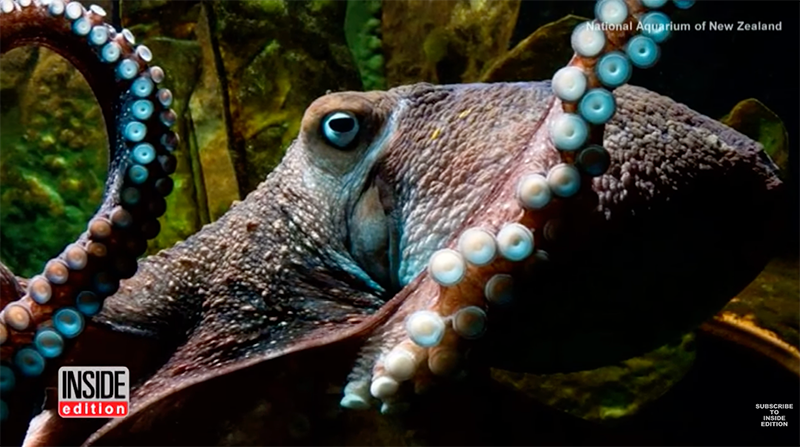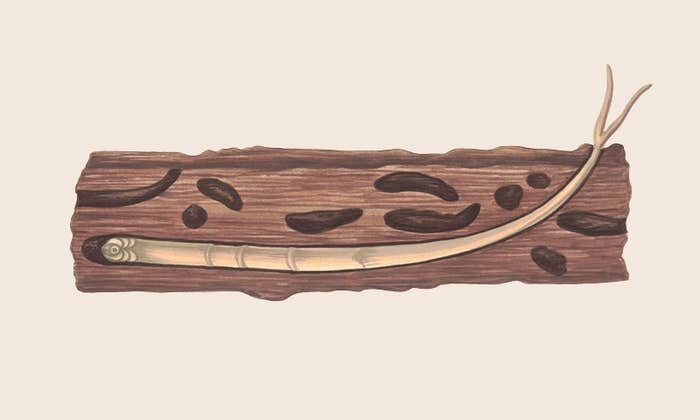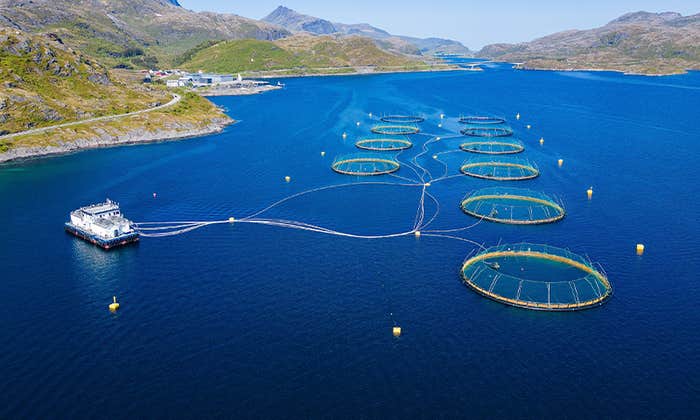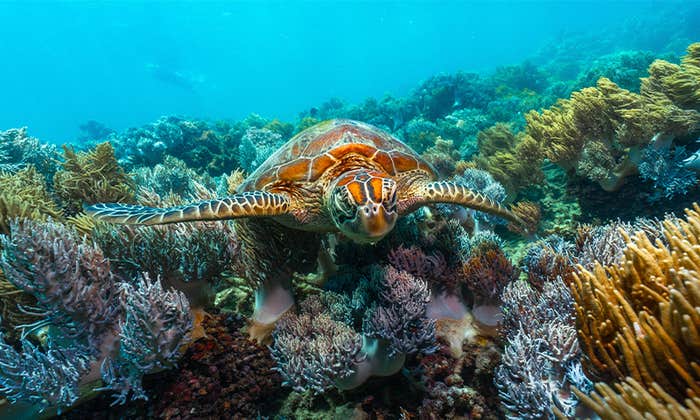It turns out there are many ways of “doing” intelligence, and this is evident even in the apes and monkeys who perch close to us on the evolutionary tree. This awareness takes on a whole new character when we think about those non-human intelligences which are very different to us. Because there are other highly evolved, intelligent, and boisterous creatures on this planet that are so distant and so different from us that researchers consider them to be the closest things to aliens we have ever encountered: cephalopods.
Cephalopods—the family of creatures which contains octopuses, squids, and cuttlefish—are one of nature’s most intriguing creations. They are all soft-bodied, containing no skeleton, only a hardened beak. They are aquatic, although they can survive for some time in the air; some are even capable of short flight, propelled by the same jets of water that move them through the ocean. They do strange things with their limbs. And they are highly intelligent, easily the most intelligent of the invertebrates, by any measure.
Octopuses in particular seem to enjoy demonstrating their intelligence when we try to capture, detain, or study them. In zoos and aquariums they are notorious for their indefatigable and often successful attempts at escape. A New Zealand octopus named Inky made headlines around the world when he escaped from the National Aquarium in Napier by climbing through his tank’s overflow valve, scampering eight feet across the floor, and sliding down a narrow, 106-foot drainpipe into the ocean. At another aquarium near Dunedin, an octopus called Sid made so many escape attempts, including hiding in buckets, opening doors, and climbing stairs, that he was eventually released into the ocean. They’ve also been accused of flooding aquariums and stealing fish from other tanks: Such tales go back to some of the first octopuses kept in captivity in Britain in the 19th century and are still being repeated today.

Otto, an octopus living in the SeaStar Aquarium in Coburg, Germany, first attracted media attention when he was caught juggling hermit crabs. Another time he smashed rocks against the side of his tank, and from time to time would completely rearrange the contents of his tank “to make it suit his own taste better,” according to the aquarium’s director. One time, the electricity in the aquarium kept shorting out, which threatened the lives of other animals as filtration pumps ground to a halt. On the third night of the blackouts, the staff started taking night shifts sleeping on the floor to discover the source of the trouble—and found that Otto was swinging himself to the top of his tank, and squirting water at a low-hanging bulb that seemed to be annoying him. He’d figured out how to turn the lights off.
Octopuses are no less difficult in the lab. They don’t seem to like being experimented on and try to make things as difficult as possible for researchers. At a lab at the University of Otago in New Zealand, one octopus discovered the same trick as Otto: It would squirt water at light bulbs to turn them off. Eventually it became so frustrating to have to continually replace the bulbs that the culprit was released back into the wild. Another octopus at the same lab took a personal dislike to one of the researchers, who would receive half a gallon of water down the back of the neck whenever they came near its tank. At Dalhousie University in Canada, a cuttlefish took the same attitude to all new visitors to the lab but left the regular researchers alone. In 2010, two biologists at the Seattle Aquarium dressed in the same clothes and played good cop/bad cop with the octopuses: One fed them every day, while the other poked them with a bristly stick. After two weeks, the octopuses responded differently to each, advancing and retreating, and flashing different colors. Cephalopods can recognize human faces.
Octopuses enjoy demonstrating their intelligence when we try to detain or study them.
All these behaviors—as well as many more observed in the wild—suggest that octopuses learn, remember, know, think, consider, and act based on their intelligence. This changes everything we think we know about “higher order” animals, because cephalopods, unlike apes, are very, very different to us. That should be evident just from the extraordinary way their bodies are constituted—but the difference extends to their minds as well.
Octopus brains are not situated, like ours, in their heads; rather, they are decentralized, with brains that extend throughout their bodies and into their limbs. Each of their arms contains bundles of neurons that act as independent minds, allowing them to move about and react of their own accord, unfettered by central control. Octopuses are a confederation of intelligent parts, which means their awareness, as well as their thinking, occurs in ways which are radically different to our own.
Perhaps one of the fullest expressions of this difference is to be found, not in the work of scientists, but in a novel. In his book Children of Time, science-fiction writer Adrien Tchaikovsky conceptualizes octopus intelligence as a kind of multithreaded processing system. For the spacefaring octopuses in Children of Time, their awareness—their consciousness—is tripartite. Their higher functions, which Tchaikovsky calls the “crown,” are embedded in their head-brain, but their “reach,” the “arm-driven undermind,” is capable of solving problems independently—sourcing food, opening locks, fighting, or fleeing from danger. Meanwhile, a third mode of thinking and communicating, the “guise,” controls the strobing and spotting of the octopuses’ “skin, ‘the chalkboard of the brain,’” where it doodles its thoughts from moment to moment. In this way, the octopuses freewheel through space, constructing ships, habitats, and whole societies which owe as much to bursts of emotion, flights of fancy, acts of curiosity and boredom, as they do to conscious intent. Tchaikovsky’s octopuses are lively, frantic, bored, creative, distracted, and poetic—all at the same time: a product of the constant dialogue and conflict within their own nervous systems. As Tchaikovsky tells it, octopuses are multiple intelligences in singular bodies.
Each of an octopus’ arms contains bundles of neurons that act as independent minds.
Tchaikovsky based his research on visits to the Natural History Museum in London, conversations with scientists and his own background as a zoologist. But what are we to make of such creatures—such intelligences—that require the tools of science fiction to make them intelligible to us? How can they appear so extraordinarily other, yet exist on the same planet, part of the same evolutionary process, as us?
The kind of self awareness which we can observe with the mirror test—the kind that is most like our own—seems to have appeared in apes somewhere between the bonobo and the orangutan, or between 18 and 14 million years ago. That’s when one of the qualities which make up our kind of intelligence seems to have evolved. Humans parted ways with chimpanzees only about 6 million years ago, so it’s understandable that our intelligence might be similar to theirs. But primates split from other mammals around 85 million years ago, while mammals themselves appeared distinct from other animals over 300 million years ago. To find a common ancestor with cephalopods, we need to go back twice that far, to 600 million years ago.
In his book Other Minds, the philosopher Peter Godfrey-Smith imagines who this common ancestor might have been. Although we cannot know for sure, it was most likely some kind of small, flat worm, just millimeters long, swimming through the deep, or crawling on the ocean floor. It was probably blind, or light-sensitive in some very basic way. Its nervous system would have been rudimentary: a network of nerves, perhaps clustered into a simple brain. “What these animals ate, how they lived and reproduced,” he writes, “all are unknown.” It’s hard to imagine something less like us, yet alive, than tiny near-blind worms wriggling on the ocean floor. But we come from them, and so does the octopus.
Six hundred million years down the evolutionary tree—and 600 million up the other side too. While that distance makes all the obvious differences between us and the octopus understandable, it makes the similarities even more startling.
The tree of evolution bears many fruits and flowers and intelligence has flowered everywhere.
One of the most remarkable features of octopuses is their eyes, which are remarkably like our own. Like ours, their eyes consist of an iris, a circular lens, vitreous fluid, pigments, and photoreceptors. In fact, the octopus eye is superior to ours in one notable way: Because of the way they develop, the fibers of the optic nerves grow behind the retina rather than through it, meaning they lack the central blind spot common to all vertebrates. And this difference exists because the octopus eye evolved entirely separately from our own, starting from that blind flatworm 600 million years ago, along an entirely different branch of the evolutionary tree.
This is an example of convergent evolution. The octopuses’ eye evolved to do much the same thing as our eye, entirely separately but only slightly differently. Two incredibly complex, but startlingly similar structures appeared in the world, by different routes, in different contexts. And if something as complex and adaptive as the eye can evolve more than once, then why can’t intelligence do the same?
This idea of branching and splitting of the evolutionary tree is overly simplistic, if not entirely false. For now, let’s simply imagine it this way: The tree of evolution bears many fruits and many flowers, and intelligence, rather than being found only in the highest branches, has in fact flowered everywhere.
The intelligence of the octopus is one such flower. As Godfrey-Smith puts it, “Cephalopods are an island of mental complexity in the sea of invertebrate animals.” Because our most recent common ancestor was so simple and lies so far back, cephalopods are an independent experiment in the evolution of large brains and complex behavior. If we can make contact with cephalopods as sentient beings, it is not because of a shared history, not because of kinship, but because evolution built minds twice over.” If twice, then likely many more.
Reprinted with permission from Ways of Being: Animals, Plants, Machines: The Search for a Planetary Intelligence, published by Farrar, Straus and Giroux. Copyright © James Bridle 2022. All rights reserved.
Lead image: Saranya_V / Shutterstock



































